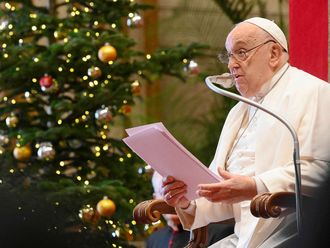Cairo: Tensions between Egypt's Muslims and Coptic Christians are not uncommon. The latest spark is ignited by a book, which Coptic critics accuse of trying to insult the Church and calling into question the tenets of Christianity.
Since published last month, Azazel, a novel by professor of Islamic philosophy Yousuf Zidan has been panned by Coptic clerics as unfair and offensive to Christianity.
"Zaidan's book seeks to persuade readers that the Azazel story is true and was found in ancient scrolls written in Syrianic and Aramiyan languages," Bishop Abdul Massih Bassiut, a theology scholar, told Gulf News.
Azazel refers to the chief of goat-demons to whom most primitive Semitic tribes offered sacrifices. The controversial novel is set in the Egyptian coastal city of Alexandria in the fourth century when the city experienced a turbulent era of shifting from polytheism to Christianity.
"The author tries to Islamise Christian beliefs and takes the side of heretics," added Bishop Bassiut.
He has disclosed that two Church lawyers are examining the book at the request of Pope Shenouda III, the top Coptic cleric, before deciding on the next move.
"We will not demand the book be banned or take the author to court. But there will be a rebuttal of the fallacies mentioned in the book," added Bassiut.
The furore over Azazel has coincided with Muslim-Coptic tensions triggered by a dispute between monks and Muslim nomads over a piece of land in the Upper Egyptian city of Minya, some 338km south of Cairo. One Muslim was killed and several others were injured in the dispute.
Christians, who are believed to make up 10 per cent of this predominantly Muslim country of 80 million, claim persecution. The Government of President Hosni Mubarak has repeatedly denied that Christians are discriminated against.
"Any Christian cleric reading Azazel as a chronicle of the history of the Coptic Church or a treatise on theology, would undoubtedly feel angry and agonised," said literary critic Helmi Namnam. "But it should be clear that the book is a literary work inspired by an important epoch in the Egyptian history, marking the shift from the ancient Egyptian religion to Christianity," Namnam told Gulf News.
He likened the Coptic reaction to Azazel to the "inquisition logic" of the Middle Ages.
"The allegation that a literary work can shake a solid heavenly religion reflects weak faith in this religion, because no work of art can discredit a divine religion," he added. The author, who teaches Islamic philosophy at Egypt's University of Alexandria, has denied Copts' accusations he seeks to undermine their beliefs.
"This is my 54th book and I did not imagine it would trigger all this debate," Zidan told the private Egyptian Dream TV.
According to him, Azazel re-reads history to draw lessons.
"The Coptic era is part of Egypt's history, which is not an internal Christian affair," he added.












